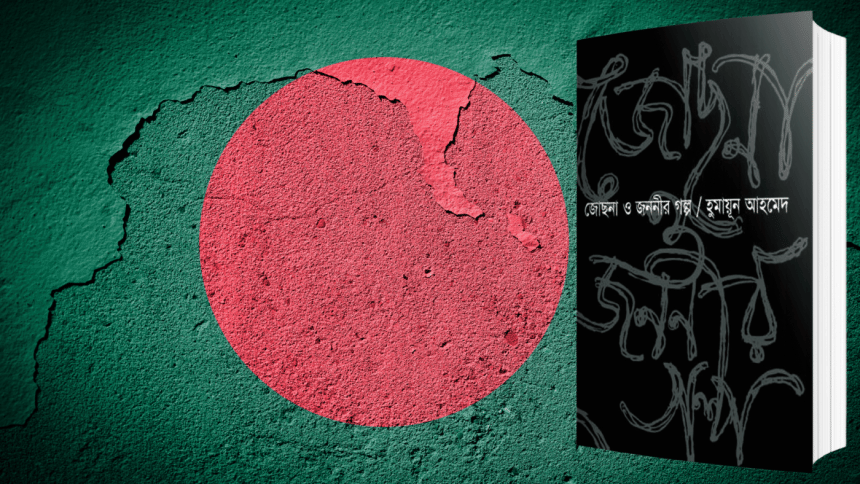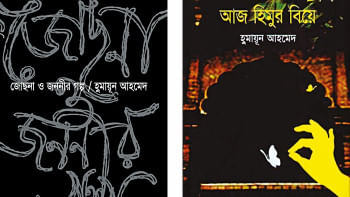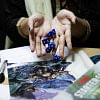Revisiting Jochna O Jononir Golpo on victory day

Humayun Ahmed's Jochna O Jononir Golpo is a timeless classic. Published in February 2004 by Anyaprokash, this book can still enrapture us with its poignant storytelling.
Jochna O Jononir Golpo is only among thousands of novels written in the context of Bangladesh's Liberation War. So, why mention this book individually? What makes it so unique?
The meaning of this book's title translates to "The story of mother and moonlight". Mother is used as a metaphor for our country, and moonlight may be referring to the natural beauty of Bangladesh or to the sparkling courage of the people who struggled to save their motherland. Unlike many books of this genre, this book doesn't only focus on the battlefields and deaths; instead, it weaves a story of the lives of seemingly ordinary people – from freedom fighters to the refugees to those who joined the ranks of Rajakars.
Jochna O Jononir Golpo gives us a bird's-eye view of Bangladesh, simultaneously narrating the stories of three main characters, describing true events that happened in 1971 and telling us the author's own experiences. Interestingly enough, even though the book is filled with an abundance of characters and many subplots, it never feels cluttered.
The three main characters of this book are Shahed, Irtazuddin, and Naimul. Throughout the book, we experience the war differently from these different characters' perspectives. We see indifferent, calm Naimul becoming a ruthless soldier, and we see Irtazuddin, initially a supporter of united Pakistan, protesting against injustice. We see these characters inspiring other characters, changing their lives, and that's when we remember hope never dies, as long as the kinship between humans remains.
It's Shahed holding a little girl's hand when the outside world is burning with fire on the night of March 25 that reminds us of the power of unity. It's the barber refusing to take money from Naimul because he is a freedom fighter that expresses the solidarity we formed during the war.
But we also get to observe the flip side, how war brings out the ugly, selfish, sadistic sides of humans. War changes people, it spurs some people to sacrifice and others to take advantage of the situation. When Ashmani, Shahed's wife, starts to face different treatment from her close ones after becoming homeless, we see how cruel humans can be. When Shah Kalim, an aspiring writer, starts brokering for Pakistani militaries, we spectate how low a human can descend.
This book's greatest strength is its characters, who are so flawed and humane that we find ourselves in them. We feel like the characters are versions of us in the context of 1971. It's the reason we cry when the characters get hurt and cheer for them to get up and live. This is why we enjoy Shahed-Ashmani's daily bickering about trivial matters, we wait with Moriom for Naimul to come back, and we gasp with disbelief seeing Irtazuudin being subjected to humiliation.
Humayun Ahmed knew how to pull at our heartstrings – making us giggle with the characters one moment and then suddenly presenting us with the gut-wrenching details of the true events that occurred, requiring us to pause and think. We feel sick seeing war criminals getting away scot-free by changing their guises but then twirl in our rooms with the book in our hands upon reading the author's experience of running and yelling on the street on the evening of December 16, tasting victory with him. And when we finally get to the last line of the book, we inadvertently mouth the word, "Ahare!" feeling the bittersweet taste of the climax.
Reading Jochna O Jononir Golpo is experiencing a whole spectrum of emotions. This is why it stands out to us because it does not just narrate the stories; it lets us live in them and inspires us to continue the legacy we struggled so much to achieve.
Sabiba enjoys anything that has time travel in it. Send recommendations at fb.com/Sabibastro

 For all latest news, follow The Daily Star's Google News channel.
For all latest news, follow The Daily Star's Google News channel. 









Comments